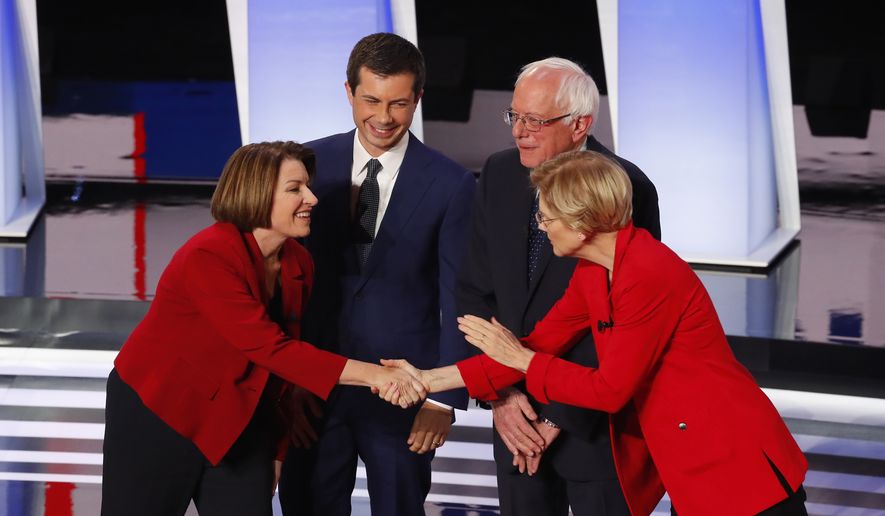OPINION:
Just as it had been in each of the four previous 2020 Democratic presidential debates, the proposed Medicare For All takeover of the nation’s health care and health insurance systems was hotly contested in their fifth face-off Wednesday night in Atlanta.
Sens. Elizabeth Warren of Massachusetts and Bernie Sanders of Vermont continue their dangerously misguided push for the abolition of private insurance and for forcing all Americans into a one-size-fits-all federal government-run plan with a price tag estimated at a mind-boggling $52 trillion over 10 years. The 160 million Americans who former Vice President Joe Biden noted like their private health insurance plans are condescendingly dismissed by Ms. Warren and Mr. Sanders. Big Brother (and Big Sister) know better. “[W]hen people have had a chance to feel it, and taste it, and live with it and we’re going to want Medicare for All,” Ms. Warren patronizingly predicted. Translation: The castor oil of socialized medicine, when forced down Americans’ throats, will ultimately prove palatable.
The spoonful of sugar that will make socialized medicine “go down in a most delightful way,” according to the angry Mary Poppins of Medicare For All, is a three-year “public option” phase-in she’s now calling for. The phase-in is presumably a grudging concession that a President Warren can’t impose a single-payer system without the support of Congress. But that didn’t appear to deter Mr. Sanders, who vowed to push for a compulsory system in “the first week of my administration.”
Seemingly lost on both was the irony of forcing all Americans to give up their current health insurance and into a national health care system. For Ms. Warren and Mr. Sanders, the concept of personal “choice” apparently applies only to abortion. That became clear when the topic of abortion rights was raised by co-host Rachel Maddow of MSNBC.
Ms. Warren dodged the question when asked whether there was “room in the Democratic Party for someone like” John Bel Edwards, the pro-life Democratic governor of Louisiana, who just four days earlier had won re-election to a second term. Instead, she blathered about how “abortion rights are human rights also economic rights,” and while conceding that abortion can be “a hard decision,” insisted that “the one entity that should not be in the middle of the decision is the government.” For Ms. Warren, keeping government out of the abortion “decision” comes with one huge, hypocritical exception, however.
“Though the word ’abortion’ does not appear anywhere in the text [of Mr. Sanders’ Medicare for All plan unveiled in April], its authors have confirmed that it’s covered,” Politico reported at the time. “The bill also notes that restrictions on federal funding for reproductive health services — namely, the Hyde Amendment’s long-standing ban on federal funding for abortion — would not apply to the new Medicare for All Trust Fund.” Ms. Warren in May called for repeal for the Hyde Amendment’s abortion-funding ban, which dates back to 1976, so her insistence that government stay out of the abortion debate carries with it a very large, divisive asterisk.
Seeking to split the difference, Pete Buttigieg, the mayor of South Bend, Indiana, eschewed Medicare for All in favor of what might be called Medicare for All Lite, “making it available to anybody who wants it, but without the divisive step of ordering people onto it whether they want to or not.”
“I believe that commanding people to accept that option — whether we wait three years, as Sen. Warren has proposed, or whether you do it right out of the gate — is not the right approach to unify the American people” on the issue of health care reform, he said.
Unifying the American people, and who could best do it, was a curious subtext throughout the debate, considering how vitriolically they all criticized President Donald Trump. At least five of the 10 candidates insisted they could nonetheless bring a badly divided country back together if they were elected. Arguably, the two most risible of those claims came from Sens. Amy Klobuchar of Minnesota and Kamala Harris of California. Mrs. Klobuchar said her campaign would appeal to “those independents and moderate Republicans who cannot stomach this guy [Mr. Trump] anymore.” Ms. Harris, after earlier calling the president “a criminal living in the White House,” said in her closing statement “we’re in a fight for our rule of law, for our democracy, and for our system of justice.” The implication was that the current president is against those things. That doesn’t sound at all unifying to us.




Please read our comment policy before commenting.